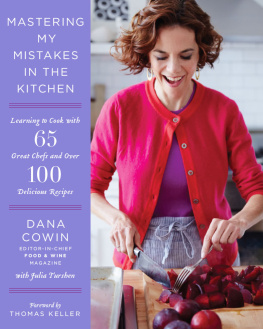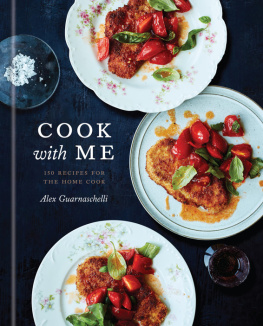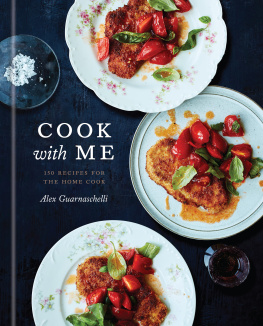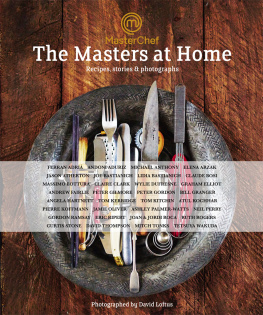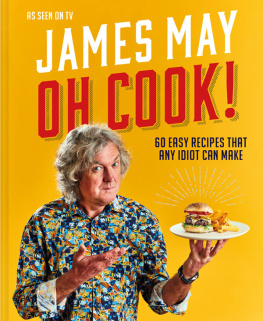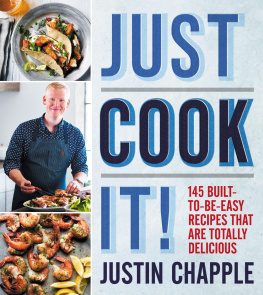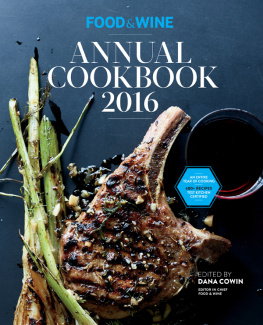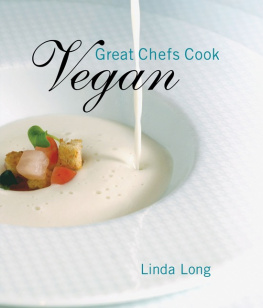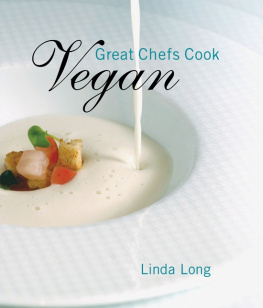To my mother,
who believed my mistakes
were learning experiences,
and
to my father,
who seemed to believe
I never made any mistakes at all
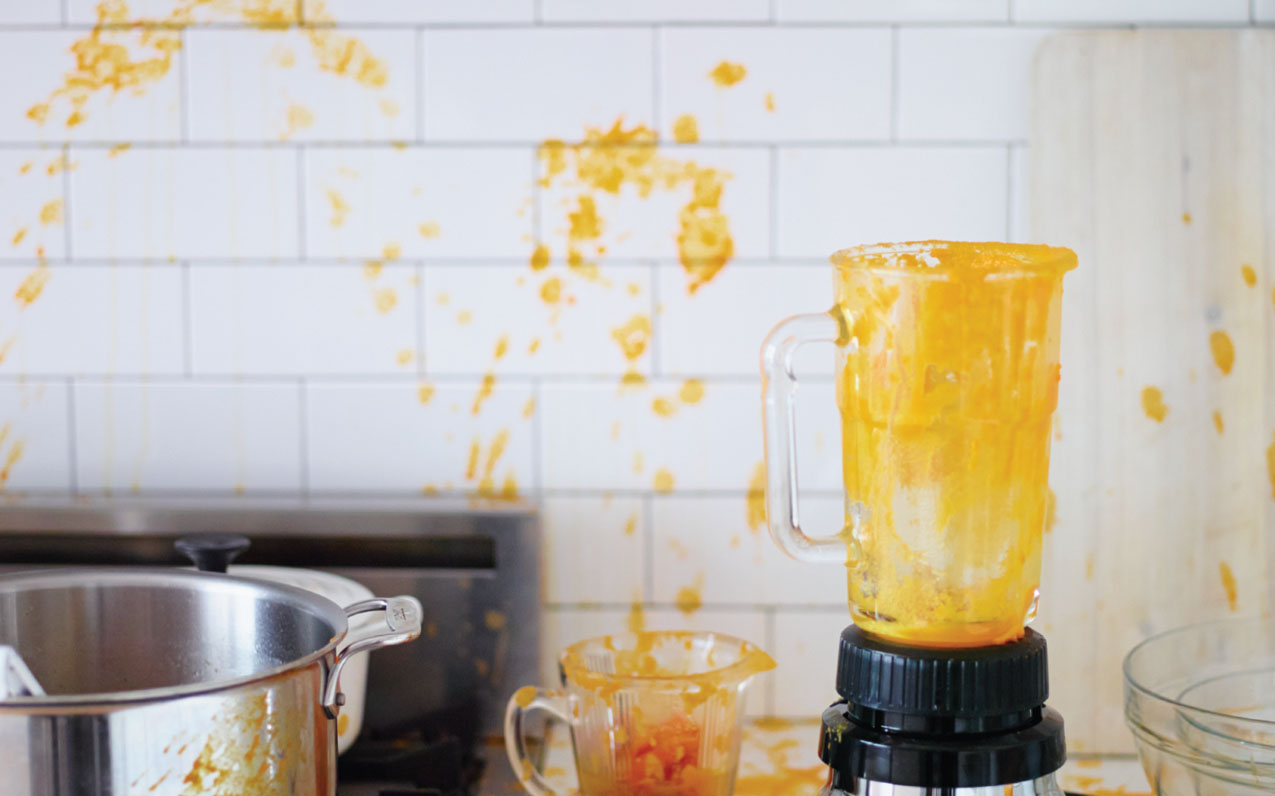
CONTENTS
Julia Child said, in My Life in France , One of the secrets, and pleasures, of cooking is to learn to correct something if it goes awry; and one of the lessons is to grin and bear it if it cannot be fixed. Julia also spoke about never admitting to a mistake because most people will never know you made one. This is certainly true, and its something that cooks do often. But learning from our mistakes is one of the most important things to do, in and out of the kitchen. If we have made mistakes, it is often because we have pushed ourselves. As cooks, we learn not only to accept the mistakes we make, but understand what we can learn from them. And we learn not to make that mistake again.
Dana Cowins Mastering My Mistakes in the Kitchen takes Julia Childs credo to heart. A self-taught and determined cook, Dana documents what she has learned from her mistakes. There to guide her is a cadre of fine chefs with whom Dana has forged friendships as they have graced the pages of Food & Wine over the years.
As the chefs help Dana right her wrongs, she gives us a unique insiders view into common challenges that we all have faced in the kitchen. Jacques Ppin demystifies the intimidating souffl with his no-fail secret and waxes poetic on the importance of timing and even-temperature baking. Daniel Holzman shows Dana the trick to making light and tender meatballs and testing for doneness. Andrew Zimmern walks Dana through a chicken stir-fry with peanuts, revealing the power of celery and how to embrace cornstarch. I also weigh in with my three-step, foolproof technique for wonderful roasted chicken.
The concept of mise en place French for put in placeis essential to the high-functioning kitchen. More than the organizing of tools and ingredients at ones station, mise en place is a mental state, one of being fully prepared. Through each chapter of her book, Dana gathers her mise en place, experiencing firsthand the importance of organization and ingredients, and as you read, you can see how each lesson shes had has become ingrained in the way she cooks and the way she lives, and you learn along with her.
In the kitchen, as in life, nothing educates us quite like our own errors. You can think of it as learning the hard way. But if everything were perfect, how would we progress? What we can take away from Danas journey is that you shouldnt just do what you are good at, avoiding things that are harder or take work. As you read, youll find yourself motivated to take joy and pleasure in working on something to get better. That said, each of the recipes Dana takes on is meant to be doable. If you make a mistake, dont automatically blame the book! Like Dana, take responsibility for your mistake, learn from it and move forward. In doing so, youll encounter some of the many life lessons disguised in this kitchen education.
When I meet young or new cooks looking for guidance, I offer them two words. The first word is patience. I remind anyone starting out on an ambitious task to take time to learn the skills they will need. Do not rush! Cooking is fun, it is rewarding and it gives us the opportunity to nurture others. That is the real reason we cook. Be patient and enjoy where you are while you are there.
The second word is persistence. Dont let anyone tell you you cant do something. Try, try, try! I became who I am today because I believed in myself. I never gave up, I couldnt and wouldnt.
These words resonate for me as I read the advice great chefs have given Dana. Throughout her recipes, Dana practices great patience and persistence, never giving up and measuring her ambition with what she has learned from the past. It takes courage to do what Dana has done with Mastering My Mistakes in the Kitchen , pushing herself out of her comfort zone and continuing to experience new things, to grow and evolve. In her personal journey, Dana shows us that these qualities are what make us successful, in and out of the kitchen.
Dana already has found success in elevating how we think about food in Food & Wine. When we think about food and wine, these two iconic symbols that bring great pleasure to us and the people around us, we dont always look behind the scenes at the journey that made this joy possible. In Mastering My Mistakes in the Kitchen , Dana takes us on that journey.
THOMAS KELLER
CHEF/PROPRIETOR,
THOMAS KELLER RESTAURANT GROUP

I am going to be honest: I am not a great cook.
As the longtime editor-in-chief of Food & Wine magazine, Ive learned a lot about food by eating in extraordinary restaurants, tasting recipes in our test kitchen daily and talking to chefs. Yet, despite all that, theres one culinary area in which I am not an expert: actual hands-on cooking.
Ive messed up literally every type of food (meat, fish, chicken, bread, pie), using every kind of technique (roasting, grilling, broiling, boiling) at every time of day (breakfast, lunch, dinner, snack). And Im always surprised by my mistakesparticularly because, by the standards of todays foodies, Im not an adventurous cook. I gravitate toward straightforward recipes with a high yum factor, a shortish ingredient list and a smart, simple trick that makes the dish seem special.
I come by my incompetence genetically. I am descended from a long line of noncooks. My mother goes out for dinner or cocktails seven nights a week. She does serve one family meal a year at home: she hosts our annual Thanksgiving feast. To the best of my knowledge, though, she has never considered cooking it herself. She has it delivered by a (very good) local takeout shop and instead devotes her time to whimsical touches like finding colorful paper turkeys and writing our names on them for place cards or procuring a selection of extraordinary desserts.
I wasnt one of those kids who compensated for their parents lack of interest in food preparation by learning to cook for myself. My friend Caroline from grade school remembers the time when we were eleven and I burned the Formica countertop in the kitchen by putting a hot pan of popcorn directly on it. The incident is seared in my memory, but apparently I had forgotten one small detail: I asked Caroline to tell my parents that she was the one who scorched the counter to avoid getting in trouble. My friend Adina recalls a time just after college when we were peeling apples side by side. I marveled at her ability to remove the peel all in one go: my apples were a patchwork of hack marks, bald spots and red skin. I wasnt a natural.
Once I got to Food & Wine in my mid-thirties, I did begin experimenting in the kitchen. On occasional Saturday nights, Id make dinner for friends, hoping one of them might bring an eligible single guy along. In the office the next week, Id share my party disasters with the test kitchen cooks and Tina Ujlaki, the executive food editor. They were always gracious and encouraging, offering advice, easier recipes, suggestions for equipment that would make any dish foolproof. They insisted the mistakes werent my fault. I wasnt so sure. Tina and I created a column for the magazine in which I recounted my kitchen mistakes and she fixed them. At the time, though, I was too embarrassed to let the world know about all my failures, from lumpy crepes to hopeless beef stews. So I used a pseudonym, Irmaa little inside joke referring to Irma Rombauer, who wrote the seminal Joy of Cooking. I loved the idea of the real Irma needing help in the kitchen.

